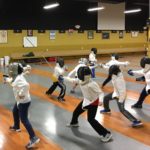Benefits of Fencing For Your Child
Fencing provides physical and cognitive benefits. Students describe fencing as a physical “game of chess.” It takes strategy and quick reflexes. Your opponent can make an attack in any number of ways and your defense needs to come in a split second, and in the next split second, you’ve got to make your attack.
Fencers learn good sportsmanship, self-discipline, gain quick reflexes, and how to compete independently.
They gain a sense of accomplishment when winning and learn to profit from their defeats. They learn to make complex decisions, analyze problems, and think fast on their feet. These ideals help children reach their potential in many areas other than fencing.
They are active and doing something, not being passive receptacles for programming beamed out from the TV.
Fencing helps children get fit – you can’t “sword fight” without a good bit of movement!
Educators are discovering that fencing can enhance mathematical performance.
Fencing helps children learn to pay attention and to develop their decision-making abilities.
Fencing helps people with ADD and ADHD to focus.
Because fencing is an individual sport, the fencer is solely responsible for their success or failure, which becomes a great lesson in responsibility.
At the same time, being a member of a fencing club gives the fencer an opportunity to participate in a group setting, where friendships are made and true sportsmanship is encouraged.




